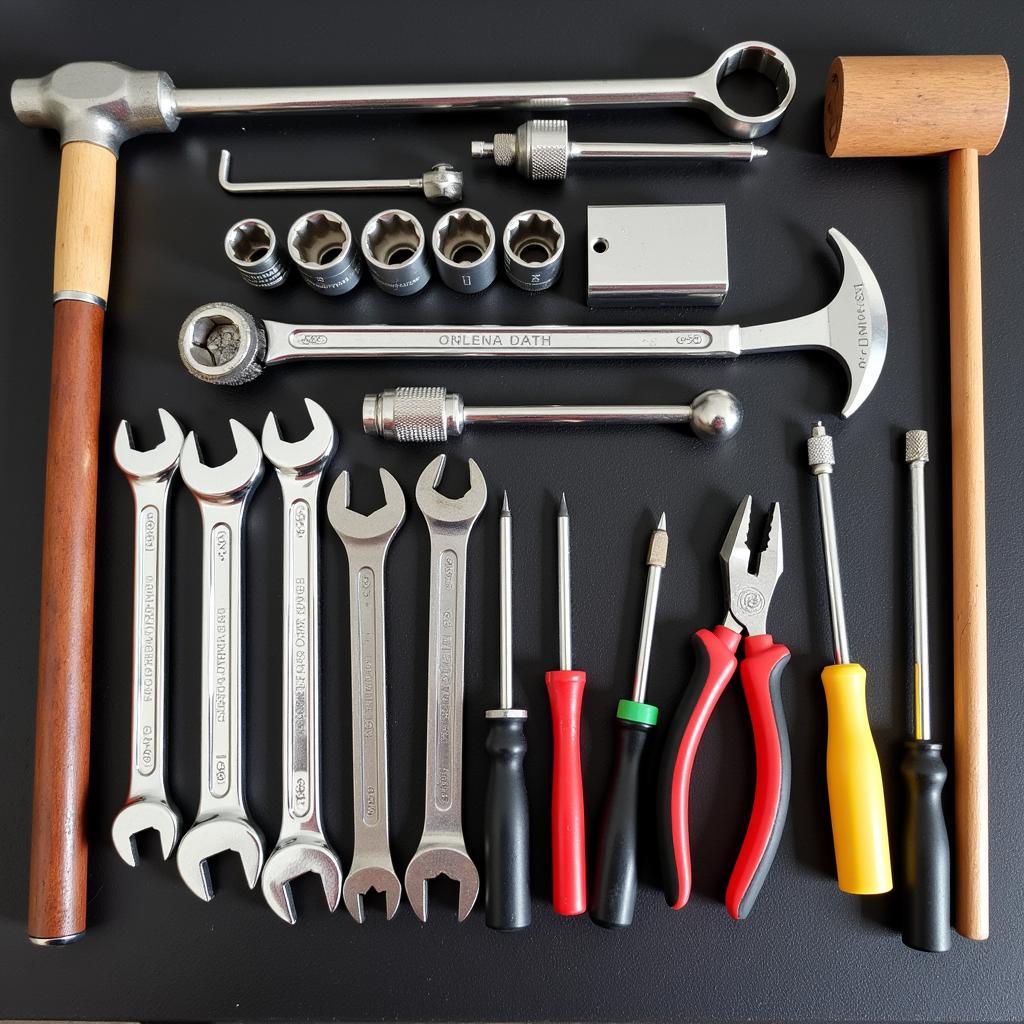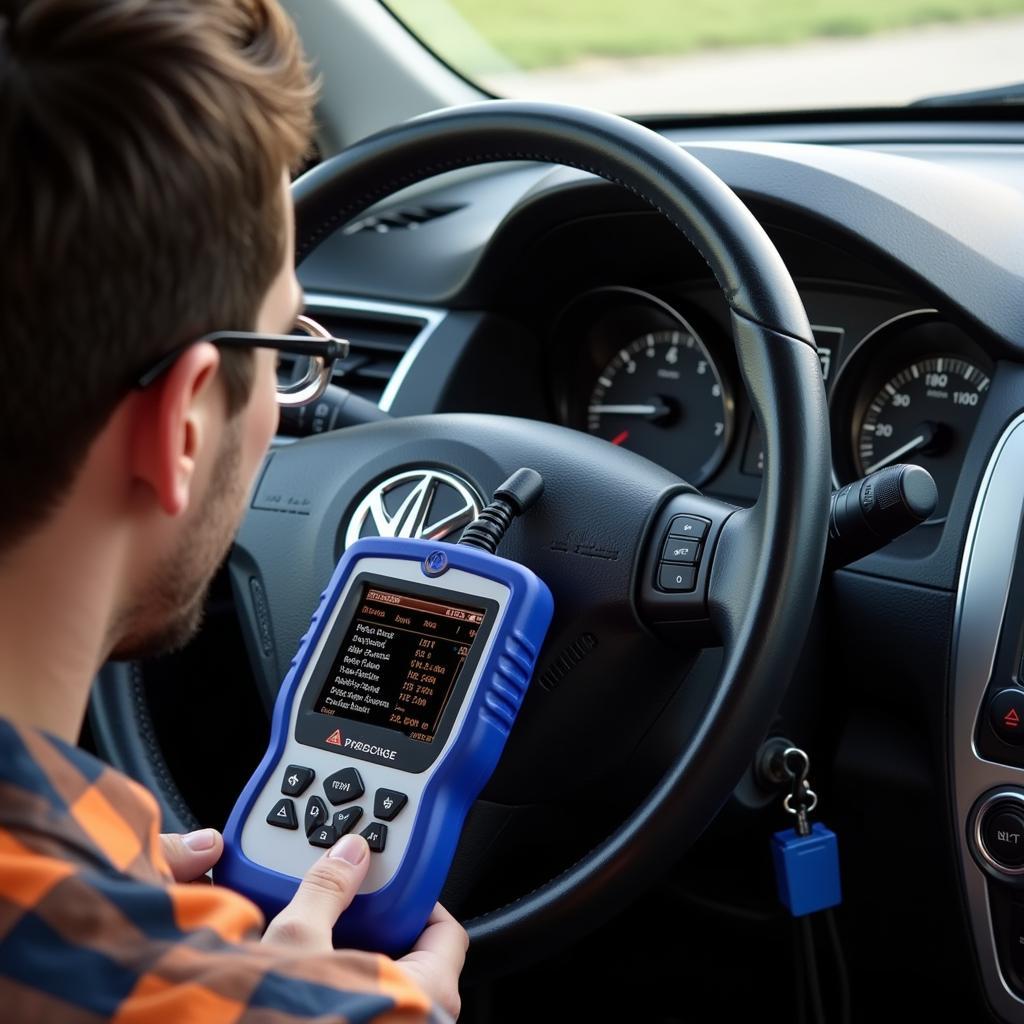A comprehensive List Of Car Tools is crucial for any mechanic, professional or at-home DIYer. Whether you’re performing routine maintenance, diagnosing a complex issue, or undertaking a major repair, having the right tools makes all the difference. This guide dives into the essential car tools you need, categorized for easy understanding.
Having the right tools for the job not only makes the task easier but also ensures it’s done correctly. From simple screwdrivers to advanced diagnostic equipment, understanding the purpose and application of each tool is essential. This car repair tools list helps you choose the perfect tools for your needs.
Essential Hand Tools: The Foundation of Your Toolkit
Every mechanic starts with a basic set of hand tools. These are the workhorses of any repair job, providing the necessary leverage, grip, and precision for countless tasks.
- Wrenches: A variety of sizes and types, including combination wrenches, open-end wrenches, and adjustable wrenches, are vital for loosening and tightening nuts and bolts.
- Screwdrivers: Phillips head, flathead, and Torx screwdrivers are essential for removing and installing screws.
- Pliers: Needle-nose pliers, slip-joint pliers, and locking pliers (often called Vise-Grips) offer various gripping and cutting capabilities.
- Sockets and Ratchets: Socket sets provide the leverage needed for removing and installing fasteners in tight spaces. Investing in a quality ratchet set is a worthwhile investment.
- Hammers: A ball-peen hammer is essential for striking punches, chisels, and other tools. A rubber mallet is also useful for jobs requiring a softer touch.
What are the most basic car tools? Wrenches, screwdrivers, pliers, sockets, and a hammer form the foundation of any car tool kit.
 Essential Hand Tools for Car Repair
Essential Hand Tools for Car Repair
Diagnostic Tools: Unveiling the Mysteries Under the Hood
Modern vehicles are complex machines, and diagnosing issues requires specialized tools.
- OBD-II Scanners: These tools connect to your vehicle’s onboard diagnostic system, allowing you to read and clear trouble codes, monitor sensor data, and perform other diagnostic functions. Understanding how to use an OBD-II scanner is vital for any serious DIY mechanic.
- Multimeters: A multimeter measures voltage, current, and resistance, helping you diagnose electrical problems.
- Test Lights: These simple tools allow you to quickly check for power or ground in a circuit.
How can I diagnose car problems myself? An OBD-II scanner, multimeter, and test light are essential for diagnosing various car problems, from electrical issues to engine performance.
Choosing the Right OBD-II Scanner: A Crucial Decision
Selecting the right OBD-II scanner can be daunting. Consider features like live data streaming, code clearing capabilities, and compatibility with your specific vehicle make and model. DiagFixPro offers a comprehensive list of best car scan tools to help you make an informed decision.
 OBD-II Scanner in Use
OBD-II Scanner in Use
Power Tools: Amplifying Your Efficiency
Power tools can significantly speed up many car repair tasks.
- Impact Wrench: Quickly removes and installs lug nuts, saving time and effort.
- Drill: Useful for drilling holes and driving screws.
- Angle Grinder: Can be used for cutting, grinding, and polishing.
What power tools are essential for car repair? An impact wrench, drill, and angle grinder are among the most useful power tools for automotive work.
Specialty Tools: Addressing Specific Needs
Certain tasks require specialized tools. This car tools list offers more information about these.
- Brake Bleeder Kit: Essential for bleeding brakes and ensuring proper brake function.
- Fuel Pressure Tester: Diagnoses fuel system problems by measuring fuel pressure.
- Compression Tester: Measures cylinder compression to diagnose engine problems.
Conclusion: Equipping Yourself for Success
Having the right list of car tools empowers you to tackle any automotive repair or maintenance task. From basic hand tools to advanced diagnostic equipment, investing in quality tools ensures efficiency, accuracy, and safety. By understanding the purpose and application of each tool, you can confidently maintain and repair your vehicle, saving money and gaining valuable skills. Remember to check out our automate how to improve customer care tools list for other helpful resources.
FAQ
- What are the must-have tools for a beginner mechanic? A basic set of hand tools, including wrenches, screwdrivers, pliers, and sockets, is a great starting point.
- How do I choose the right OBD-II scanner? Consider features, compatibility, and your budget.
- What safety precautions should I take when using car tools? Always wear appropriate safety glasses and gloves, and use tools in a well-ventilated area.
- Where can I find quality car tools? Reputable auto parts stores and online retailers offer a wide selection.
- How do I maintain my car tools? Keep them clean, organized, and stored properly to ensure their longevity.
- What are some advanced diagnostic tools for experienced mechanics? Oscilloscope, and professional-grade scan tools offer more in-depth diagnostic capabilities.
- Are there any online resources for learning about car repair? Yes, websites like DiagFixPro offer valuable information and guides.
Need help with your car diagnostics? Contact us via WhatsApp: +1(641)206-8880, Email: [email protected] or visit us at 910 Cedar Lane, Chicago, IL 60605, USA. We offer 24/7 customer support.

Leave a Reply